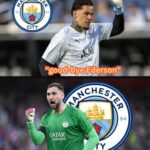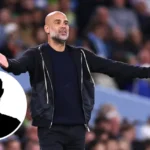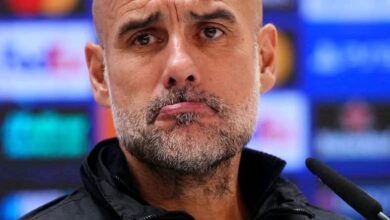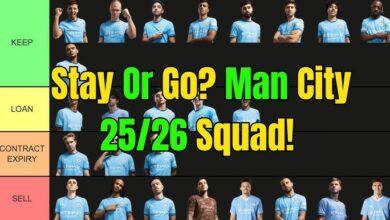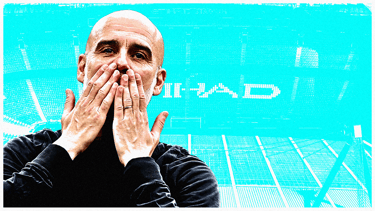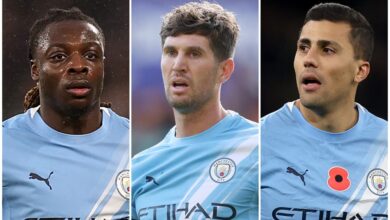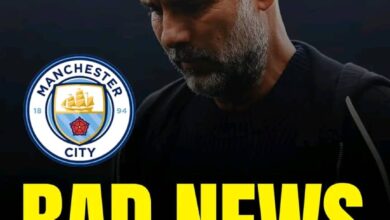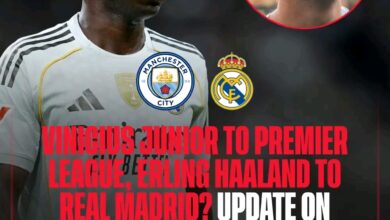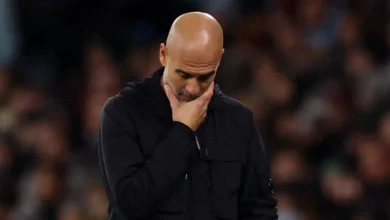Club make contact over deal for Jack Grealish as part of a stunning two-player Premier League raid
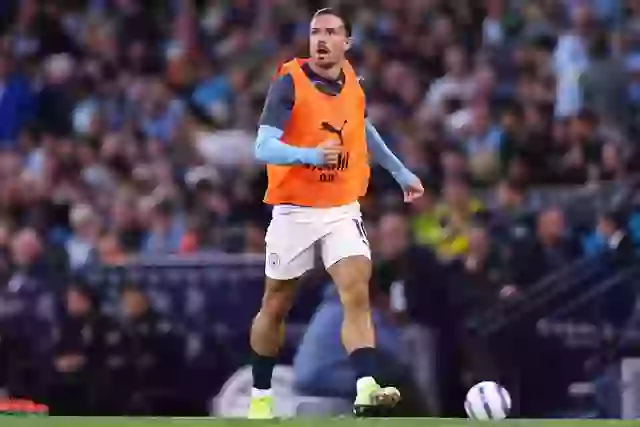
Jack Grealish’s current situation at Manchester City can best be described as occupying a professional limbo—a state of uncertainty that few players at the pinnacle of world football ever expect to encounter. This predicament became publicly acknowledged when Pep Guardiola, in a moment of characteristic directness, encouraged the midfielder to explore opportunities elsewhere at the conclusion of the previous season. Such a statement from a manager of Guardiola’s stature carries immense weight, effectively signaling that a player who once commanded a British transfer record fee of £100 million has fallen significantly in the pecking order.
The concept of limbo in football careers is particularly devastating for players of Grealish’s caliber. At 29 years old, he finds himself in what should be the prime years of his career, yet facing the prospect of limited playing time at a club where he was expected to flourish. This situation reflects the brutal nature of modern football, where even substantial financial investments in players can quickly become sunk costs if performances don’t meet expectations or if tactical preferences shift.
Grealish’s limbo extends beyond mere squad selection issues. It encompasses questions about his tactical fit within Guardiola’s evolving system, his ability to adapt to the intense demands of City’s playing style, and ultimately, his future in elite-level football. The psychological impact of such uncertainty cannot be understated, particularly for a player who was once considered one of the Premier League’s most exciting talents during his time at Aston Villa.
The Struggle for Minutes: A Season of Frustration
The previous Premier League season proved to be a defining period for Grealish, though not in the manner he would have hoped. His battle for regular playing time became emblematic of the challenges facing even the most expensive signings when they fail to consistently meet the exacting standards set by their manager. The statistics tell a sobering story—significantly reduced minutes compared to his debut season, with most appearances coming from the substitutes’ bench rather than as a starter.
This reduction in playing time coincided with recurring injury problems that plagued Grealish throughout the campaign. Injuries in professional football can create a vicious cycle, where reduced match fitness leads to increased susceptibility to further physical issues, which in turn makes it harder to regain one’s place in the team. For Grealish, these injury concerns compounded his struggles to maintain the consistency that Guardiola demands from all his players.
The sight of Grealish watching “most of the campaign from the bench” became a recurring image that spoke volumes about his diminished status within the squad. This bench-warming role represented a dramatic fall from grace for a player who had been Villa’s talisman and creative fulcrum for years. The psychological adjustment from being the focal point of a team’s attacking play to becoming a peripheral figure in a star-studded squad represents one of the most challenging transitions in professional football.
The culmination of Grealish’s difficult season came on the final day of the Premier League campaign against Fulham, when Guardiola made the decisive choice to leave him out of the matchday squad entirely. This omission sent a clear message about the manager’s current assessment of the player’s contribution to the team’s objectives.
Guardiola’s Frank Assessment: The Manager’s Perspective
Pep Guardiola’s post-match admission following the Fulham game represented a moment of brutal honesty that, while potentially damaging to Grealish’s market value, demonstrated the manager’s pragmatic approach to squad management. Guardiola’s statement that the England international “could leave the Etihad as he needs to play regularly” was both an acknowledgment of Grealish’s talent and a recognition that the current situation serves neither the player nor the club effectively.
This type of public declaration from Guardiola is relatively rare and suggests that private conversations between manager and player had already established this reality. The Catalan’s approach to man-management often involves direct, sometimes uncomfortable conversations about players’ futures, reflecting his belief that clarity, however harsh, is preferable to false hope or prolonged uncertainty.
The manager’s assessment likely takes into account several factors: Grealish’s adaptation to City’s tactical system, his injury record, his consistency in training and matches, and the emergence of alternative options in similar positions. Guardiola’s track record shows he is not sentimental about expensive signings if they don’t contribute to the team’s success, as evidenced by his treatment of other high-profile acquisitions throughout his managerial career.
From Guardiola’s perspective, maintaining a player who isn’t regularly contributing to the first team represents an inefficient use of resources, both in terms of salary expenditure and squad harmony. His encouragement for Grealish to seek opportunities elsewhere can be interpreted as both professional advice and tactical necessity.
The Club World Cup Exclusion: A Clear Signal
The decision to leave Jack Grealish at home while Manchester City traveled to the United States for the FIFA Club World Cup provided perhaps the clearest indication yet of his standing within the squad hierarchy. Club World Cup participation represents one of the most prestigious tournaments available to elite clubs, and exclusion from such a competition sends an unmistakable message about a player’s current importance to the team.
This exclusion was particularly significant given that Club World Cup squads typically include players who might not be first-choice for domestic competitions but could prove useful in a tournament setting. The fact that Grealish didn’t even make this extended traveling party suggests his isolation from Guardiola’s immediate plans extends beyond mere tactical preferences to questions about his overall contribution to squad dynamics.
The timing of this exclusion, coming immediately after Guardiola’s public comments about Grealish’s future, created a narrative of managed decline that few players recover from. In modern football, such clear signals from management often become self-fulfilling prophecies, as player confidence diminishes and performance levels struggle to reach the standards required for rehabilitation.
The psychological impact of missing such a significant tournament while teammates compete for major honors cannot be underestimated. For a player of Grealish’s ambitions and self-perception, watching from afar as his colleagues pursue silverware represents a personal and professional low point.
Strategic Reinforcements: The Rayan Cherki Signing
Manchester City’s acquisition of attacking midfielder Rayan Cherki in June served as another clear indication of the club’s future planning and Grealish’s diminished role within those plans. The signing of Cherki, a highly-rated young talent with significant potential, represents the type of strategic recruitment that often signals the beginning of the end for established players in similar positions.
Cherki’s arrival increases competition in the forward positions at a time when Grealish was already struggling to secure regular playing time. This additional competition creates a scenario where Grealish must not only regain his previous form but surpass the performances of an ambitious newcomer eager to establish himself at one of Europe’s elite clubs.
The timing of Cherki’s signing, coinciding with Guardiola’s public comments about Grealish’s future, suggests coordinated planning by the club’s hierarchy. This recruitment strategy reflects modern football’s ruthless approach to squad development, where sentiment rarely influences decision-making when performance standards aren’t met.
From a tactical perspective, Cherki’s signing allows Guardiola greater flexibility in his forward planning while providing insurance against Grealish’s potential departure. The French midfielder’s youth and adaptability make him an attractive long-term option, whereas Grealish’s age and current form trajectory suggest a more uncertain future contribution.
The De Bruyne Departure: Changing Dynamics
The decision by Manchester City not to renew Kevin De Bruyne’s contract, resulting in the Belgian maestro’s move to Serie A champions Napoli, represents a seismic shift in the club’s midfield dynamics. De Bruyne’s departure removes one of the most influential players in City’s recent success and creates both opportunities and challenges for the remaining squad members.
For Grealish, De Bruyne’s exit theoretically opens up creative responsibilities that could have provided an opportunity for renaissance. However, the fact that this significant squad change hasn’t improved Grealish’s standing within Guardiola’s plans suggests that the manager’s assessment of the English midfielder extends beyond simple positional competition.
De Bruyne’s successful transition to Napoli also provides a template for other City players seeking regular football elsewhere. The Belgian’s move demonstrates that leaving Manchester City doesn’t necessarily represent a step down in career ambitions, particularly when joining clubs with realistic prospects of domestic and European success.
The timing of De Bruyne’s departure, occurring simultaneously with questions about Grealish’s future, creates an interesting parallel between two players at different stages of their careers but both seeking situations that better serve their professional objectives.
Napoli’s Interest: A Potential Lifeline
Reports suggesting that Napoli have contacted Jack Grealish’s representatives regarding a potential move represent the first concrete indication of external interest in the Manchester City midfielder. Napoli’s recent success in integrating Premier League players who had fallen out of favor at their previous clubs provides an encouraging precedent for Grealish’s potential resurrection.
The Italian club’s track record with Scott McTominay and Billy Gilmour, both of whom played crucial roles in Napoli’s title-winning campaign after leaving Premier League clubs where they struggled for regular football, demonstrates the club’s ability to rehabilitate careers. This model of recruitment suggests that Napoli’s interest in Grealish represents more than opportunistic speculation.
However, the reported concerns about Grealish’s salary levels highlight one of the practical challenges facing any potential move. His Manchester City wages, reflecting his status as a £100 million signing, likely exceed what most clubs outside England’s top tier are willing or able to afford. This financial reality could necessitate creative solutions, such as loan arrangements with City contributing to his salary.
The suggestion that Napoli might pursue a loan deal with Manchester City covering a portion of Grealish’s wages represents a potential win-win scenario. Such an arrangement would allow Grealish to regain regular playing time in a competitive environment while enabling City to reduce their wage bill without completely writing off their investment.
The Chiesa Connection: Parallel Circumstances
Federico Chiesa’s situation at Liverpool provides an interesting parallel to Grealish’s predicament at Manchester City. Both players arrived at their respective clubs with significant expectations but have struggled to establish themselves as regular starters under demanding managers. Chiesa’s reported exclusion from Liverpool’s pre-season tour, ostensibly due to minor injury concerns, echoes the type of managed marginalization that Grealish has experienced.
The Italian winger’s slow adaptation to life at Anfield mirrors many of the challenges that Grealish has faced at City. Both players possessed outstanding reputations at their previous clubs but have found the transition to new tactical systems and increased competition more challenging than anticipated. Chiesa’s rumored availability for transfer suggests that Liverpool, like City with Grealish, are willing to cut their losses on expensive acquisitions that haven’t delivered expected returns.
Chiesa’s desire to win back his place in the Italy national team ahead of the 2026 World Cup adds another dimension to his potential move. Regular club football represents not just career rehabilitation but also international ambitions. For Grealish, similar considerations about his England career could influence his decision-making regarding any potential transfer.
The possibility of both players ending up at Napoli would represent a fascinating case study in career rehabilitation. The Italian club’s apparent willingness to provide platforms for talented players seeking to rediscover their best form could prove mutually beneficial.
International Implications: World Cup Considerations
The approaching 2026 World Cup adds urgency to both players’ situations, though for different reasons. Chiesa’s desire to regain his place in the Italy national team reflects the reality that consistent club performances remain the primary pathway to international recognition. Italy’s current position in World Cup qualifying—sitting third in their group behind Norway and Israel—creates additional pressure for players to maintain high performance levels.
For Grealish, England’s depth in attacking positions means that periods of inactivity at club level could effectively end his international career. The Three Lions’ embarrassment of riches in creative positions leaves little room for players who aren’t regularly featuring for their clubs. Gareth Southgate’s replacement will likely prioritize form and fitness over reputation when selecting squads.
The World Cup timeline creates a natural deadline for both players’ career decisions. Moves that provide regular football and the opportunity to rediscover peak form become increasingly attractive when viewed through the lens of international ambition. For players of their caliber, missing a World Cup due to club-level stagnation would represent a significant career regret.
The Broader Context: Modern Football’s Ruthless Reality
The situations facing both Grealish and Chiesa reflect broader trends in modern football, where expensive signings are quickly discarded if they fail to meet immediate expectations. The financial stakes involved in elite-level football create environments where patience for adaptation periods is limited, and players must prove their worth rapidly or face marginalization.
This ruthless approach to squad management, while potentially harsh on individual players, reflects the competitive pressures facing top clubs. The financial and sporting costs of maintaining underperforming assets can be substantial, making difficult decisions about player futures an inevitable part of modern football management.
The globalization of football markets also means that clubs like Napoli can offer attractive alternatives to players seeking regular football. The Italian club’s recent success in rehabilitating careers suggests that strategic moves away from Europe’s most elite clubs can prove beneficial for all parties involved.
Conclusion: Crossroads and Consequences
Jack Grealish’s situation at Manchester City represents one of football’s most compelling narratives of unrealized potential and career crossroads. His journey from Aston Villa talisman to Manchester City bench player highlights the challenges facing even the most talented individuals when they struggle to adapt to new environments and expectations.
The potential move to Napoli offers a pathway to career rehabilitation that could benefit all parties involved. For Grealish, it represents an opportunity to rediscover the form and confidence that made him one of England’s most exciting talents. For Manchester City, it provides a solution to a challenging situation while potentially preserving some value from their substantial investment.
The coming weeks will likely prove decisive in determining Grealish’s future direction. Whether he remains at City to fight for his place, accepts a move to Serie A, or explores other options, his decision will have significant implications for both his club and international career prospects.
The broader lessons from Grealish’s situation extend beyond individual circumstances to highlight the unforgiving nature of modern elite football. Success at the highest level requires not just talent but adaptability, resilience, and sometimes the wisdom to recognize when a change of scenery might provide the best path forward.
As the transfer window progresses and clubs finalize their squad planning for the upcoming season, Jack Grealish’s future remains one of the most intriguing storylines in world football. His next move could determine whether his career trajectory continues its current decline or finds new life in a different environment, making his decision one of the most consequential of his professional life.


